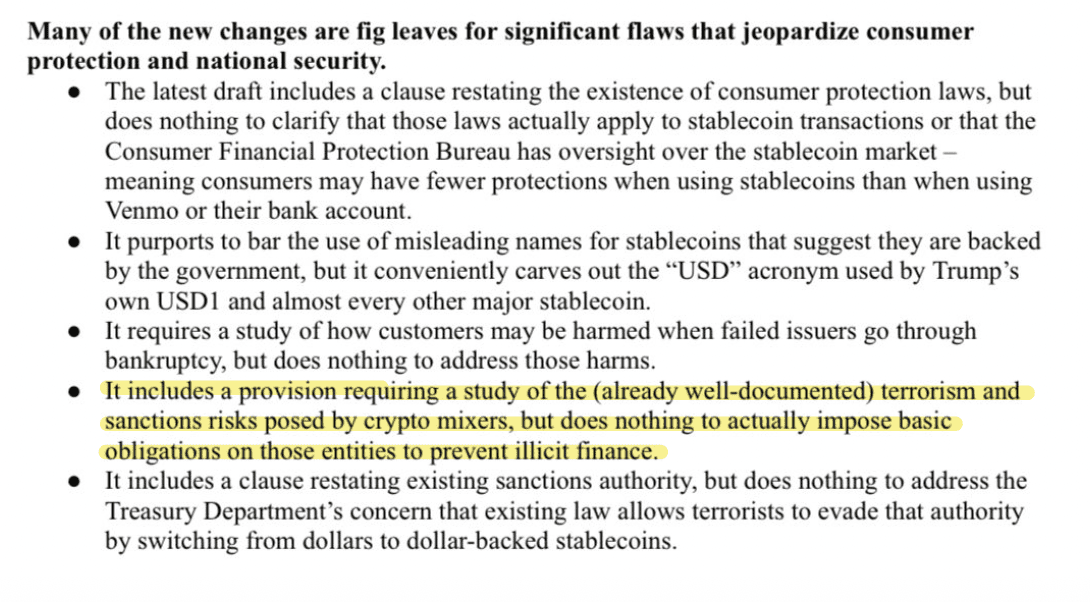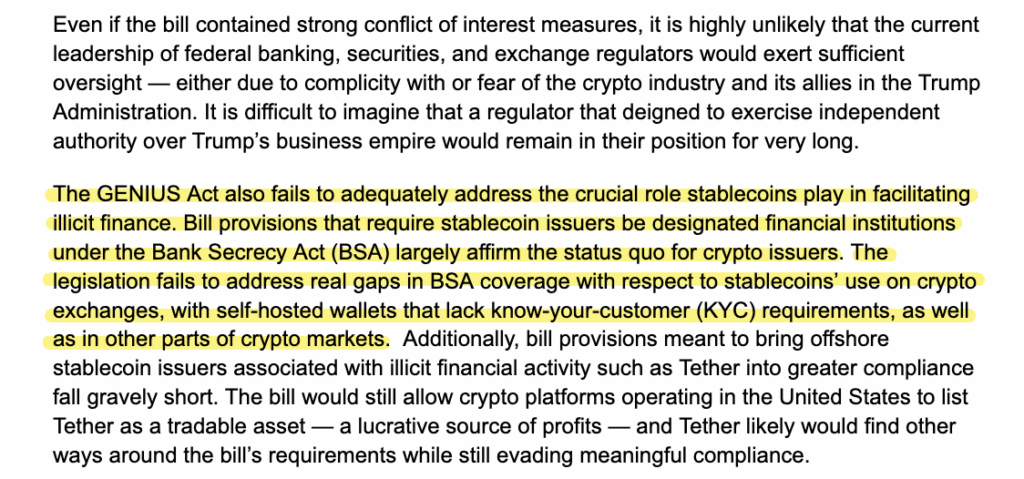
Whereas the GENIUS Act is a stablecoin invoice, U.S.-based Bitcoin fans ought to be being attentive to the language within the invoice because it pertains to the power to transact privately with crypto property — together with bitcoin.
Two paperwork that not too long ago circulated amongst Senate Banking Committee Democrats point out that Senate Democrats need to see amendments made to the GENIUS Act that will vastly scale back person privateness in crypto transactions.
Senate Democrats’ Evaluation of GENIUS Act
The primary of those two paperwork is a two-pager entitled “Banking Committee Democratic Staff Analysis on Latest GENIUS Act Draft”.
This doc is stuffed with the kind of rhetoric that’s generally related to the Rating Member of the Senate Banking Committee, Senator Elizabeth Warren (D-MA).
It refers to stablecoins as instruments for illicit finance (even supposing the largest stablecoin issuer, Tether, often works with the Department of Justice (DoJ) and the FBI to cease the unlawful use of stablecoins).
It additionally states that the present iteration of the GENIUS Act “does nothing to really impose fundamental obligations on [crypto mixers] to stop illicit finance.”

This latter critique of the invoice is antithetical to steering that Deputy Lawyer Basic (DAG) Todd Blanche provided in a memo on April 7, 2025. DAG Blanche said that the DoJ will now not goal crypto mixing services for the acts of their finish customers.
On this doc, nevertheless, Senate Democrats point out that they plan to proceed focusing on crypto mixing expertise as an alternative of those that abuse it.
If amendments concerning the focusing on of crypto mixers are added to a revised model of the GENIUS Act, this might have an effect on Bitcoin customers who make use of such expertise within the identify of preserving their privateness.
A Letter From Democrats Opposing The GENIUS Act
Senate Banking Democrats circulated a second doc on Monday, as effectively.
This doc, a letter signed by 46 advocacy teams, opposed the GENIUS Act.
Brendan Pedersen of Punchbowl News shared segments of the letter on X.
The authors of the letter declare that the GENIUS Act doesn’t do sufficient to stop illicit finance partly as a result of it nonetheless permits for “self-hosted wallets that lack know-your-customer (KYC) necessities.”

If the GENIUS Act is amended in order that it requires KYC for all wallets that contact stablecoins — self-custodial wallets included — it’s probably solely a matter of time earlier than comparable regulation is established for Bitcoin wallets.
Bitcoin Transactional Privateness Is At Stake
Simply because the GENIUS Act doesn’t immediately reference Bitcoin doesn’t imply that Bitcoin gained’t be affected by it.
If Senate Democrats get their manner and crypto mixers change into a goal of the invoice and/or if the invoice requires that each one wallets that contact stablecoins require customers to KYC, and the invoice is enacted into legislation, anonymity in crypto transactions will change into against the law.
So, whereas some Bitcoiners could also be anti-stablecoins, most, I’d wager, aren’t anti-privacy. Subsequently, it might behoove them to contact their elected officers to induce them to vote “no” for the GENIUS Act if the upcoming iteration of the invoice restricts the power to transact privately.

